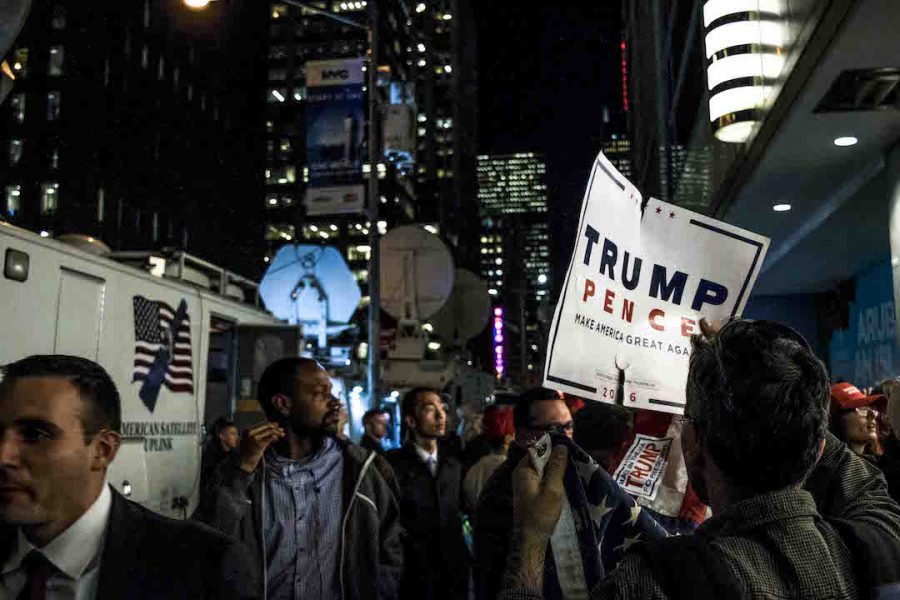Against the Not-So-Grand Old Party
A Trump/Pence sign outside of the Hilton being waved on Election Night
In most presidential elections, citizens vote for a nominee simply because of the party they align with. This year, however, many Republicans could not bring themselves to vote for Donald Trump, choosing instead to break from the Republican party.
Several NYU students who identify as Republicans said they did not vote for Trump because they did not feel that he represents
Republican ideals.
“I did not vote for Donald Trump even though I still identify as a Republican,” Emily Harris, a CAS junior, said. “I just think that associating Donald Trump with conservative values is actually really disruptive to the Republican party.”
Harris is not the only Republican to feel this way and perhaps for good reason. Trump presents himself as an outsider to Washington, eschewing both traditional Democratic and Republican values and making clear his beliefs that policymakers on both sides of the aisle have failed America.
CAS freshman Cameron Oakes, who identifies as a Republican, said she would not vote for Trump just because he was Republican and because she did not believe his business skills justified the possibility of his presidency.
“You can find hundreds of other Republicans who have run way more successful companies that haven’t cheated the laws and not paid taxes and bankrupted companies and ruined people’s lives,” Oakes said. “I think if you’re going to pull a non-politician for Republican bases, there are plenty more successful Republicans that are better people and know more about the world around them than Donald Trump does.”
Harris said that although she has always identified as a Republican, this was the first time she has felt extremely conflicted during an election.
“I’ve never had to question that in terms of who I’m voting for or who’s representing me, and in this election I’ve really had to step back and say, ‘what does being a Republican mean to me?’” Harris said. “I really feel like I will never vote for Donald Trump, even if it means voting for another party.”
It’s no secret how divided the Republican party has become in the wake of Trump’s candidacy. Former fellow presidential candidates Mitt Romney and Jeb Bush have loudly voiced their decision not to back Trump, while many representatives in the House have indicated they will not be voting for him. Meanwhile, the #NeverTrump movement has seen support come from both the left and the right.
Young Republicans especially feel that Trump does not represent the ideals of millennial Republicans.
“Donald Trump is completely unappealing to especially college women,” Harris said. “I feel like that has kind of plummeted grasping that demographic for the party, which I think is really sad because it just doesn’t represent what the Republican Party is going for.”
LS freshman Christopher Zhen believes the different opinions about Trump showcase the age divide in the Republican party.
“I think it’s kind of interesting how the older [Republicans] say, ‘Oh we’re voting for Trump, you know, for your guys’ future’ when in reality, a lot of us don’t actually support Trump,” Zhen said. “We support down and out Republicans.”
Although many Republicans did not vote for Trump, they also did not decide to vote for Hillary Clinton. Others voted for third party candidates as they felt these candidates aligned with their ideals, while Clinton did not.
Harris said she did not want to vote for Clinton simply because she did not agree with Trump.
“I really wanted to sit this election out, but that would have just been quite stupid because you’re given the power to vote,” Harris said. “But at the same time, I couldn’t really justify voting for HIllary Clinton just because I hated Donald Trump. I want to completely support where my vote is going.”
With the controversy surrounding Trump’s candidacy, Republicans have seen people breaking from their respective parties. They believe it could be difficult to unify the party in the aftermath of the election.
“I think it poses a pretty substantial divide. The biggest issue for Republicans going forward after this election is the rebranding of the party,” Oakes said. “I just don’t feel that way. I think the biggest thing would be unifying the party and gaining the voters back that we lost because of the way he’s run his campaign.”
A version of this article appeared in the WSN 2016 Election Issue. Email Natasha Roy at [email protected].
Natasha is a CAS sophomore studying journalism and public policy, and she's an editor-at-large at WSN this semester. Originally from a small town outside...





















































































































































